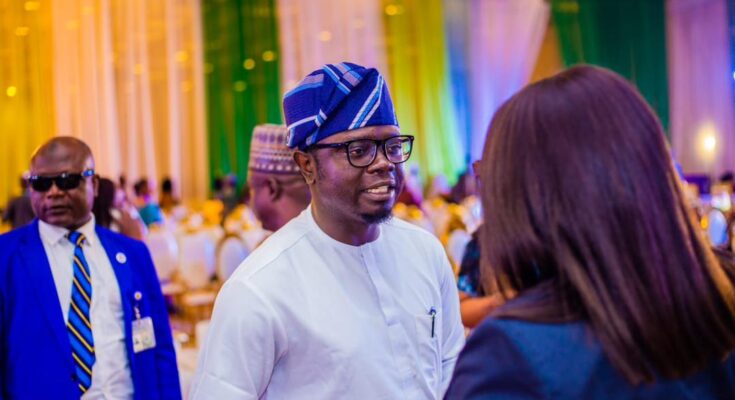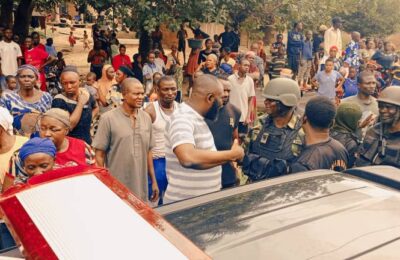What Has Ayodele Olawande Achieved In One Year As Minister?
By Sunusi Musa
Fiction writers, especially those with the creative and imaginary sense to craft what resembles the truth, would most certainly be successful. However, those who write about the achievements of those in power cannot fabricate lies, because performance in office is like the sun, even those who can’t see it would most definitely feel the heat. And as one of the most vocal politicians in Nigeria would say, “if e didn’t dey, e didn’t dey.” Today, as open and interconnected as our world is, it is almost impossible to present a lie and get away with it.
Therefore, as we mark the one year anniversary in office of the Honourable Minister of State for Youth Development, Comrade Ayodele Olawande, it is time to present the truth about his service in the last one year; and to invite all those who have doubt to fact-check. Of course, in the case of Comrade Olawande, it is not only the countable achievements that qualify as performance, even the intangible and the unquantifiable actions combined to give a picture of a man who understands the expectations of his office right from the word GO.
Coming to office on the heels of a national call for a youthful Minister for the Ministry of Youth Development, Olawande understands the aspiration of a large percentage of the youth population for a Minister of their ilk, one who understands them, their sentiments and think like them. Hence, to mirror his undertanding of the desire of majority of Nigerian youth, he crafted a “Youth4Youth” agenda to reflect his commitment to deploying his youthful energy to serve the youth constituency.
Yes, some commentators have said that a youth Minister needs not be a youth. But then, agitation for youth inclusion in leadership globally, and even Nigeria’s recent history with the ‘Not Too Young To Run’ attest to the ongoing campaign for governance activities to be conducted with the youth, and not for the youth. Moreover, in a country with over 60% of its population under the age of 20, there is possibly no better way to reflect the desire to have this significant number of our population represented at the decision making table other than having one of them bring onboard their unique perspectives, especially on issues that are peculiar to that demography.
Hence, when President Bola Ahmed Tinubu appointed Ayodele Olawande as Minister of State for Youth Development, it was with the clear expectation that he would conduct his assignment with the necessary openness that gives the youth a sense of belonging and afford them the necessary access for rewarding engagements with the government. On this count, Olawande has performed creditably.
While the President’s performance assessment template for the Ministry of Youth Development required that the Ministers “initiate and implement quarterly citizen and stakeholder engagement sessions to serve as feedback mechanism for the government,” Olawande, who was appointed in October 2023 had, by April 2024, held 10 engagement sessions in Borno, Delta, Akwa Ibom, Cross River, Niger, Enugu and Kano States. This was apart from his visits to over 16 NYSC Orientation Camps to engage with Nigerian youth on national service. You may want to know the outcome of these engagements.
As the President expected, the engagements served as a veritable platform, not only for feedback but also for harvesting the inputs of youth into the plans of the Ministry. Through the engagements, Olawande received information from youth in the States he visited on the peculiar challenges confronting them and their proposed solutions, based on the circumstances within their local environments. Like the Minister said during one of the sessions in Borno, “we can’t sit back in Abuja and assume we know all that you want. As a youth Minister, I must have the strength to go out and engage with fellow youth to know how they want the government to help.”
Also, a significant discovery from the engagements of the Minister of State for Youth Development was the fact that many of the youth who were already trained in different skill areas lacked the required financial support to utilize the skills. To address this, the Minister engaged with the Bank of Industry, as well as the private sector to assist with funding. This intervention extended to corps members who acquired skills through the Skill Acquisition and Entrepreneurship Development (SAED) program of the NYSC. He specifically launched the Corpreneur Support Initiative, in partnership with Wema Bank, to give startup grants to selected corps members.
Apart from his accessible nature, declaring his office as the home of every youth which they can visit at anytime, Olawande has also taken the job of facilitating opportunities for youth as a key priority. In his commitment to remove any form of barrier between him and the youth he was appointed to serve, the Minister always gives out his phone number at most of his engagements, while encouraging young people with workable ideas to come forward. Doubtless, those who have embraced his charge and brought forward one proposal or the other can bear witness to the fact that he always pulled all the stops to ensure their ideas are supported and encouraged.
For someone whose life story reads like a fairy tale dotted with several thorns, and with his only saving grace being the skills he possessed in building, photography etc; it makes sense that the legacy Olawande aspires to was to be remembered as a Minister who guarantees that majority of Nigerian youth possessed at least two skills with which they can earn meaningful existence. To drive this aspiration, he championed the ‘One Youth, 2 Skills’ campaign and initiated a platform (Nigerian Youth Academy) to drive it. His expectation was that through NIYA, the Ministry of Youth Development would be able to bridge the skill gap and facilitate access to market-relevant training for young people at no cost.
The Green House Initiative, which is aimed at providing a platform similar to NiYA for the informal youth across communities in all the 774 Local Government Areas, would serve as a grassroot job and support centre where any young person at that level can go to receive support, as well as information about Federal Government’s youth-related interventions. The GHI would also serve as the working centre for the NIYA Ambassadors who will coordinate the physical training similar to the one being done online for the formal youth.
Always seeking to phase out the yawning gap between the youth and the government with the constant refrain, “young people must be able to see the government, feel the government and touch the government,” Olawande recently got a Presidential approval for the establishment of a Youth House in Abuja. The Youth House, which would serve as another avenue for social interaction, as well as a platform for youth to find their self-identity and express their passion and abilities, would be replicated as Youth Centres across the 36 States. With a corresponding Green Houses at the local levels, Olawande’s goal was essentially to decentralise access to government programmes, and by so doing enhance the grand vision of President Bola Ahmed Tinubu to deliver a country that works for all Nigerians, irrespective of where they live.
A firm believer in productive dialogue as a sustainable solution to addressing incessant youth agitations, the Minister spearheads the convocation of a National Youth Conference to foster dialogue and deeper engagement with youth. The youth confab would also serve as a platform for young people nationwide to effectively engage with the government, deliberate on national issues and proffer solutions to specific youth issues and challenges. Clearly, Olawande holds the belief that providing a platform for youth to express themselves, with government respecting their thoughts and ideas, would prove valuable for preventing and addressing many social problems.
Other key achievements of the Minister of State in the last 12 months include a campaign to checkmate profiling and harrassment of youth. In partnership with the office of the Minister of State for Police Affairs, Olawande launched the ‘Young & Secure’ initiative to facilitate national conversation on the issue of youth harrassment and to address the nagging issue of distrust between young people and the security agencies. He also set up a ‘Youth Help Desk’ as a component of the “Young & Secure” initiative to receive real time information and report from victims, and also serves as a centralised hub for efficiently managing and resolving complaints of Nigerian youth. The Help Desk equally serves as a veritable avenue to receive opinions, suggestions and feedbacks from the youth about the activities of the Ministry.
Understanding that the core mandate of the Ministry of Youth Development was essentially to facilitate opportunities for young people, the Minister has initiated and cemented a couple of partnerships with government agencies and other development partners to improve the lot of Nigerian youth. Some of these include a partnership with the National Information Technology Development Agency (NITDA) to deliver the Digital Literary for All (DL4ALL) program aimed at training 30 million in digital literary; partnership with the Presidential Initiative on Compressed Natural Gas (PiCNG) to empower 2,000 youth with CNG-powered tricycles; partnership with the National Data Protection Commission (NDPC) to train 5,000 youth in data protection and privacy; and the partnership with Plan International to deliver interventions in youth health, empowerment and leadership.
While some of the interventions and programs of the Ministry are still work in progress, the efforts made in the last one year reflect a deep commitment to positioning the Youth Development Ministry to deliver on its mandate in a sustainable manner. Having just been demerged from the previous Ministry of Youth and Sports Development, the Ministry of Youth Development, now standing alone, has used the last one year to clearly get its priorities, deliver quick wins and, above all, redefine the face of the Ministry itself to be in tandem with the aspiration of majority of Nigerian youth who desire closer engagement with government, and a more deliberate involvement in the process of making decisions that have significant impact on their lives as young Nigerians.
* Musa, a Senior Advocate of Nigeria, writes from Abuja.




